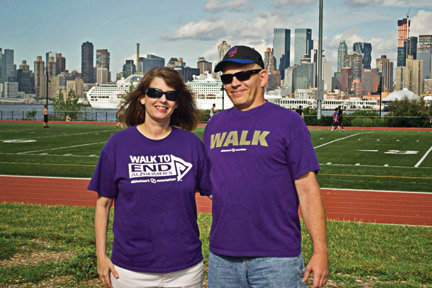Weehawkenites Bill Bemke and Isabel Diaz are best friends. They go to concerts together (they just saw Santana and will see the B-52s soon), they talk and visit constantly, and they have reunited a group of Weehawken classmates together through the social media network phenomenon known as Facebook.
But that’s not all the friends have in common. Bemke and Diaz have also watched many family members live with – and die from – Alzheimer’s.
“Toward the end of my father’s life, I’d leave work to feed him at his assisted living home, and then tell him I had to go back to work,” Diaz said. “He’d ask me, ‘Why are you going to work? You’re in kindergarten.’ The day before he passed, he didn’t know who I was.”
Her father was one of many members of her family to suffer from the disease. Alzheimer’s is the most common form of dementia that slowly takes the memory and mobility of its sufferers, and Bemke himself has lost two uncles in the last three years, both in their late 60s.
“There’s no describing [Alzheimer’s] other than it’s horrible.” – Bill Bemke
____________
Diaz has walked solo in various Alzheimer’s fundraisers for the past five years, and last year, Bemke decided to join her. Then their friend Nelson Sosa, also a Weehawken classmate with close ties to the disease, chimed in.
Soon, Diaz and her newly-reacquainted circle of around 15 Weehawken Facebook friends formed a team they named “Fighting to Remember” who will join together in Point Pleasant in the fall to raise money for the disease with the non-profit organization, Walk to End Alzheimer’s.
“It will be a big emotional day for everybody because we’ll all be together for a cause that’s affected every single one of us,” Diaz said. “Great friends, great walk, great cause.”
What we don’t know
There is no known cure for Alzheimer’s, and approximately 5.4 million Americans – or, one in eight older Americans – are currently diagnosed. As the sixth leading cause of death in the United States, it cannot be prevented or slowed, and the exact cause is yet unknown.
“There is one drug that’s supposed to help slow it down,” Bemke said, “But you have to diagnose the disease in its early, early stages.”
But doing so is complicated, he added, as early symptoms oftentimes mimic the natural signs of aging, and then there’s the matter of misdiagnosis. Doctors can prescribe certain medications to help control the symptoms once the disease has progressed beyond the early stages, but the side effects of the medications are frequently worse than the symptoms they’re meant to treat.
Diaz knows this all too well.
“Doctors numb patients with pills because some of them become agitated or try to leave assisted living when they forget where and who they are,” she said. “My father was completely zombied out by his medications and he got progressively worse, so we took him off the meds, and he came back for a while.”
Alzheimer’s and its universal effects
“I don’t wish to condemn those who care for patients, but assisted living is a hard situation for everyone to deal with,” Bemke said. “Patients can have fits, they’re lost and scared, and they’re surrounded by strangers.”
Around $200 billion in Alzheimer’s patient care is estimated for 2012 according to the Alzheimer’s Association website. And over 15 million Americans provide care for patients who cannot pay for that care, which costs approximately $210 billion annually.
“It’s a complete drain on personal resources as well as the healthcare system,” Bemke explained. “To pay for assisted living, they take everything from you: your home, your property, and your Medicare checks. You lose everything.”
Because the disease lasts so long, and usually lands the sufferer in assisted living situations, family members suffer greatly as they watch their loved ones fade away.
“My mom would just sit with my father all day,” Diaz recalled. “She would hold his hand and make sure he was fed and cleaned. It tore us apart. She lost 30 pounds and I gained 30 pounds in six months. It kills you because there’s nothing you can do.”
What they plan to do
While there is nothing currently to be done to cure those diagnosed with Alzheimer’s, Diaz and Bemke have chosen to do something to help figure out what needs to be done by raising money for research.
So far, with their 15 members, they have managed to raise $1,200. Their goal is $2,500, but they’d love to raise as much as possible, including awareness about the disease.
On Sept. 29 they will join the Walk to End Alzheimer’s in Point Pleasant and they encourage anyone interested in joining their team or donating to the cause to visit act.alz.org, click on “Walk to End Alzheimer’s, Fall 2012” in the right-hand column, click “Search for a team,” and enter “Fighting to Remember.”
You can also visit their Facebook page by logging in and searching “Alzheimer’s Memory Walk “Fighting to Remember” Team.”
Gennarose Pope may be reached at gpope@hudsonreporter.com
